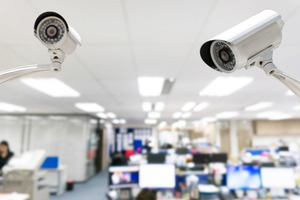
Here’s what you need to know.
What Kind of Surveillance Is Common?
First, it helps to understand the types of surveillance employers typically use. This can include video cameras in public areas, monitoring emails or internet usage on company devices, tracking phone calls, or even GPS monitoring on work vehicles. Employers might say this is to protect company property, ensure productivity, or maintain safety. While these reasons make sense, there are legal limits to keep everyone’s privacy in check.
What Does New York Law Say?
New York doesn’t have a single law that covers every aspect of workplace surveillance. Instead, the rules come from a mix of state and federal laws, plus court decisions.
- Video Surveillance: Employers can use cameras in public areas like entrances or standard rooms, but secretly recording in places where you have a reasonable expectation of privacy, like restrooms or changing rooms, is illegal. So, no hidden cameras where employees expect privacy.
- Electronic Communications: If you’re using a company email or phone, your employer generally has the right to monitor those communications. However, New York is a “one-party consent” state regarding recording conversations. This means at least one person involved in the conversation must consent to being recorded. If your employer records phone calls, one of the parties in the call must know about it. Secretly recording without consent can land the company in legal trouble.
- Computer and Internet Monitoring: Employers can check your use of work computers and internet activity, especially on company networks and devices. This usually includes tracking websites you visit, your keystrokes, or downloads. However, personal devices and personal accounts generally have more protection from such monitoring.
- GPS Tracking: If your job involves company vehicles or devices, employers often use GPS to track location. They must notify you if you’re being tracked, and it should be related to work purposes, not personal tracking.
What About Consent and Notification?
Employers are encouraged—and often required—to tell employees if and how they’re being monitored. Many companies include surveillance policies in employee handbooks or contracts. If you haven’t been told anything, it’s a good idea to ask. Transparency helps avoid misunderstandings and builds trust.
Why Does This Matter?
Understanding these rules is essential for both employees and employers. You have rights and options if you feel your privacy is being invaded beyond what’s legally allowed. On the flip side, employers need to respect privacy boundaries to avoid lawsuits and keep morale high.
What Should You Do If You Suspect Illegal Surveillance?
If you think your employer is spying on you in a way that breaks the law—like secret recordings in private spaces or monitoring personal devices without consent—don’t ignore it. Keep notes about what you’ve observed, when, and how it made you feel uncomfortable. Contact an employment lawyer who knows New York law to discuss your situation. They can help you understand your rights and determine the best next steps.
A Balanced Approach Benefits Everyone
Workplace surveillance isn’t just about rules and restrictions. When done correctly, it protects businesses and employees alike. Clear policies, open communication, and respect for privacy create a healthier workplace. Knowing where the line is helps everyone feel safer and more secure on the job.
If you have questions or concerns about workplace monitoring or any employment issue in New York, we can help. Having someone who understands the local laws and can guide you through the complexities makes a big difference. Contact Borrelli & Associates, P.L.L.C. today to schedule a confidential consultation.



















